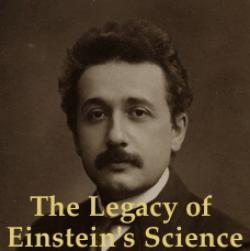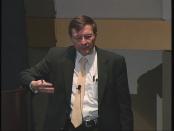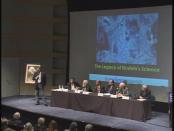
The Legacy of Einstein's Science
American Friends of the Hebrew University present this conference, commemorating the 100th anniversary of Albert Einstein's Annus Mirabilis (Miracle Year).
-

Session 1
Topics:
Speakers: William Isacoff, Lili Haydn, Hanoch Gutfreund, David Gross
Run Time: 1 hours 01 minutesWelcome - William Isacoff, Event Chair Musical performance by Lili Haydn Hanoch Gutfreund "1905 - Einstein's Miraculous Year of...
-

Session 2
Topics:
Speakers: Tsvi Piran, Edward Wright, Terrence Sejnowski
Run Time: 1 hours 28 minutesTsvi Piran"Black Holes - the Ultimate Outcome of Einstein's General Theory of Relativity"Edward Wright"Einstein and the Accelerating...
-

Session 3
Topics:
Speakers: Sol Golomb, David Gross, Hanoch Gutfreund, Tsvi Piran, Terrence Sejnowski, Edward Wright, Roger Bingham, Harold Varmus
Run Time: 57 minutesPanel Discussion:Sol Golomb, David Gross, Hanoch Gutfreund, Tsvi Piran, Terry Sejnowski, and Edward Wright; moderated by Roger BinghamHarold...
Download the program
Session I
- Introduction: William Isacoff, Event Chair, UCLA
- Musical Performance: Lili Haydn, violinist & vocalist
- Hanoch Gutfreund, Hebrew University of Jerusalem
- David Gross, UC Santa Barbara
Session II
- Tsvi Piran, Hebrew University of Jerusalem
- Edward Wright, UCLA
- Terry Sejnowski, Salk Institute
Session III
- Panel Discussion: moderated by Roger Bingham
- Sol Golomb, USC
- David Gross, UC Santa Barbara
- Hanoch Gutfreund, Hebrew University of Jerusalem
- Tsvi Piran, Hebrew University of Jerusalem
- Terry Sejnowski, Salk Institute
- Edward Wright, UCLA
- Harold Varmus, Memorial Sloan-Kettering Cancer Center
Roger Bingham

Roger Bingham is a member of the research faculty at the Center for Brain and Cognition, University of California, San Diego, where he focuses on theoretical evolutionary neuroscience. He is also a member of the Computational Neurobiology Laboratory at the Salk Institute, La Jolla. He is co-author of The Origin of Minds: Evolution, Uniqueness, and the New Science of the Self (Harmony Books, December 2002). Before he joined the Center for Brain and Cognition, he was a visiting associate in biology at the California Institute of Technology, and the creator and host of award-winning PBS science programs on evolutionary psychology and cognitive neuroscience. His many honors for communication of science include the National Magazine Award, seven Los Angeles Emmy awards, the American Psychological Association Award for Excellence in Television, and the Writer's Guild of America award for Outstanding Documentary Script.
Sol Golomb

Dr. Sol Golomb holds appointments both at USC's School of Engineering and the College of Letters, Arts & Sciences' department of mathematics. Dr. Golomb earned his bachelor's degree from Johns Hopkins University and his master's and doctoral degrees from Harvard, all in mathematics. His graduate work in the early 1950's was focused on algebraic structures and shift register sequences. Dr. Golomb realized that his mathematical work could be applied to transmission of digital electronic messages. From 1956 to 1963, he worked at the Jet Propulsion Laboratory in Pasadena, CA. In 1961 Dr. Golomb was able to demonstrate his mathematical ideas on digital signals through detecting a radar signal bounced off the planet Venus. He has served as a consultant to numerous government agencies, including NASA, the U.S. Army and the U.S. Department of Transportation. Dr. Golomb arrived at USC in 1963. He was president of the Faculty Senate from 1976 to 1977 and vice provost for research from 1986 to 1989. In 1985, he was awarded USC's Presidential Medallion; it is the highest honor the university bestows on a member of the USC community. In 1993, he was awarded the title of University Professor, an honor reserved for professors who have made significant contributions to USC in many disciplines. Dr. Golomb has received numerous medals, awards and honorary degrees in recognition of his many research accomplishments, including the Shannon Award, elected membership to the National Academy of Engineering, fellow of the American Association for the Advancement of Science, and foreign member of the Russian Academy of Natural Sciences. Most recently, in 2003 he was named a member of the National Academy of Sciences. Dr. Golomb's mathematical work over the past 40 years has influenced communications theory, becoming a vital tool in applications ranging from radar to cellular phones.
David Jonathan Gross

Born in Washington, D.C., Dr. David Jonathan Gross received his undergraduate degree from The Hebrew University of Jerusalem and his Ph.D. in physics form the University of California, Berkeley. After serving as a junior fellow at Harvard University Dr. Gross began his professional teaching career at Princeton University in 1969 and was appointed professor of physics in 1972. He was named director of the Institute of Theoretical Physics at the University of California, Santa Barbara in 1997, a position he holds until this day. In 2002 he was named the Frederick W. Gluck Chair in Theoretical Physics, an endowed chair for the director of the Kavli Institute for Theoretical Physics. On October 5, 2004 the Royal Swedish Academy of Sciences announced Dr. Gross as the 2004 Nobel Prize recipient in Physics, along with Frank Wilczek and H. David Politzer, "for the discovery of asymptotic freedom in the theory of the strong interaction," and were credited with bringing "physics one step closer to fulfilling a grand dream, to formulate a unified theory comprising gravity as well- a theory for everything." In addition to receiving the Nobel Prize, Dr. Gross has received numerous awards for his work, including the J.J. Sakurai Prize of the National Academy of Sciences in 1986, a MacArthur Foundation Fellowship in 1987, the Dirac Medal in 1988, the Oscar Klein Medal from Stockholm University in 2000, the 2003 European Physical Society Prize in Elementary Particle Physics, the Grande Medaille D'Or of the French Academy of Science, as well as an honorary degree from The Hebrew University.
Hanoch Gutfreund

Hanoch Gutfreund is the current chairman of The Hebrew University of Jerusalem's worldwide exhibitions on Albert Einstein. Born in Cracow, Poland, Professor Gutfreund immigrated to Israel in 1948. He began a long professional association with The Hebrew University, obtaining a M.Sc. in Physics in 1962 and a Ph.D. in Physics in 1966. His professorship at The Hebrew University's Racah Institute of Physics was followed by administrative leadership roles: as Head of the Racah Institute (1981-1984), Rector (1990-1992) and President (1992-1997). Professor Gutfreund's research interests include theoretical Solid State Physics and Computational Neuroscience. He is a member of Hebrew University's Interdisciplinary Center for Neural Computation. Internationally recognized, he has been a visiting scientist at Stanford University and a professor at the University of Paris VI and Ecole Normale Superieure. Within the realm of higher education in Israel, Professor Gutfreund is known for his service on the National Committee on Science Education, the Pedagogical Council of the Ministry of Education and for chairing a National Committee on University-Industry Relations.
Lili Haydn

George Clinton calls her "the Jimi Hendrix of the violin." Rolling Stone called her music "an impassioned mix of classical, pop, rock, and funk." In a time of countless sound-alike bands and musicians, Lili Haydn is a true original; seamlessly tying together her passionate blend of musical styles with the soulful, nakedly emotional sound of her violin and voice. The violinist of choice in the rock world, Lili has worked with everyone from Funkadelic to Jimmy Page and Robert Plant, Sting, Josh Groban and the LA Philharmonic. As a solo artist, Lili has released two critically acclaimed major label recordings and continues to perform domestically and internationally.
William Isacoff

Dr. William Isacoff was born in Brooklyn, New York and raised on Long Island, where he received his undergraduate degree from Hofstra University. In 1970, he received his Medical Degree from New York Medical College. After completing his fellowship training in Hematology/Oncology at UCLA-Harbor General in Torrance California, he began his research and teaching career at the UCLA-Harbor General Hospital, accepting the position as Associate Chief of Medical Oncology, which he held until 1980. He did pioneering research on the Biochemical Pharmacology of Methotrexate, thus leading to the safe use of high dose treatment formulations for patients with Osteogenic Sarcoma. This work led to the effective disease control that enabled patients to be cured without amputation. From 1975 to 1981 he was a Senior Consultant to the Rand Corporation in Santa Monica. Currently he holds an Academic Appointment within the Department of Medicine at the UCLA David Geffen School of Medicine, and serves on the Board of Directors of the Jonsson Comprehensive Cancer Center Foundation. His current research interests focus on new treatment development for Pancreatic Cancer, and has been a principle investigator and consultant to The Southwest Oncology Group, and The American College of Surgeons Oncology Group. This year, he is the recipient of the Medical Visionary Award from the Pancreatic Cancer Action Network, a national patient advocacy organization. He is as a member of the Board of Governors of the Hebrew University.
Tsvi Piran

Born in Tel Aviv, Israel, Professor Tsvi Piran holds the Schwartzmann Chair at The Hebrew University and is a 2004- 05 Moore Distinguished Scholar at the California Institute of Technology. He received his Bs.c. in Physics, Cum Laude, and Ms.c. in Space Science, Magna Cum Laude from Tel Aviv University, later achieving his Ph.D. in Physics from Hebrew University of Jerusalem. Prof. Piran has served as Visiting Professor for various prestigious academic institutions such as, New York University, Columbia University, Harvard University, and is a Long term Member at the Institute for Advanced Studies of Princeton University. Prof. Piran's current body of research includes General Relativity, Relativistic Astrophysics, Black Hole Physics and Cosmology. His major efforts in the last years were devoted to the study of gamma-ray bursts. A mysterious phenomenon discovered in the sixties which remained unexplained until recently. Prof. Piran has also edited numerous scientific books and is the author of The Big Bang Theory (in Hebrew) and over 200 publications in scientific journals. His many honors include the Fruend Prize for best scientific popular article in Hebrew, the Gravity Research Foundation (USA) award (2001, 1999, 1996, 1992, 1990, 1987), and the Mifal Hapais Award for best PhD thesis, 1976.
Terrence Sejnowski

A pioneer in the field of computational neuroscience, Dr. Terrence Sejnowski is an Investigator with the Howard Hughes Medical Institute and is the Francis Crick Professor at The Salk Institute for Biological Studies where he directs the Computational Neurobiology Laboratory. He is also Professor of Biological Sciences and Adjunct Professor in the Departments of Physics, Neurosciences, Psychology, Cognitive Science, and Computer Science & Engineering at the University of California, San Diego, where he is Director of the Institute for Neural Computation. Dr. Sejnowski received a B.S. in physics from the Case-Western Reserve University, an M.A. in physics from Princeton University, and a Ph.D. in physics from Princeton University in 1978. Dr. Sejnowski received a Presidential Young Investigator Award in 1984, the Wright Prize from the Harvey Mudd College for excellence in interdisciplinary research in 1996, and the Hebb Prize for his contributions to learning algorithms by the International Neural Network Society in 1999. In 2003 he was elected to the Johns Hopkins Society of Scholars. In 1989, Dr. Sejnowski founded Neural Computation, published by the MIT Press, the leading journal in neural networks and computational neuroscience. The long-range goal of Dr. Sejnowski's laboratory is to understand the computational resources of brains and to build linking principles from brain to behavior using computational models. This goal is being pursued with a combination of theoretical and experimental approaches at several levels of investigation ranging from the biophysical level to the systems level.
Harold Varmus

Harold Varmus, former Director of the National Institutes of Health and co-recipient of a Nobel Prize for studies of the genetic basis of cancer, has served as the President and Chief Executive Officer of Memorial Sloan-Kettering Cancer Center in New York City since January 2000. He is a graduate of Columbia University's College of Physicians and Surgeons and worked as a medical student in a hospital in India. Much of Dr. Varmus' scientific work was conducted during 23 years as a faculty member at the University of California, San Francisco, working alongside distinguished colleague, Dr. J. Michael Bishop and with their co-workers, demonstrated the cellular origins of the oncogene of a chicken retrovirus. This discovery led to the isolation of many cellular genes that normally control growth and development and are frequently mutated in human cancer. For this work, Bishop and Varmus received many awards, including the 1989 Nobel Prize for Physiology or Medicine. Varmus is also widely recognized for his studies of the replication cycles of retroviruses and hepatitis B viruses, the functions of genes implicated in cancer, and the development of mouse models for human cancer (the focus of much of the current work in his laboratory at Memorial Sloan-Kettering Cancer Center). In addition to authoring over 300 scientific papers and four books, including an introduction to the genetic basis of cancer for a general audience, Varmus has been an advisor to the Federal government, pharmaceutical and biotechnology firms, and many academic institutions. He served on the World Health Organization's Commission on Macroeconomics and Health, chairs the Board of Directors of Public Library of Science and the Scientific Board of the Grand Challenges in Global Health, and is involved in initiatives to promote science in other countries.
Edward L. (Ned) Wright

Edward L. (Ned) Wright received his ABscl and PhD degrees from Harvard University, and was a Junior Fellow in the Society of Fellows. After teaching in the MIT Physics Department, Professor Wright has been at UCLA since 1981. Prof. Wright is i
Roger Bingham
Hanoch Gutfreund
Lili Haydn (musician)
Tsvi Piran
Terrence Sejnowski




